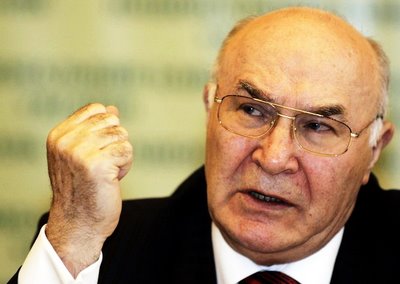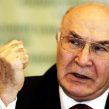
Ukrainian Central Bank to Become More Independent from Government
Publication: Eurasia Daily Monitor Volume: 6 Issue: 52
By:

The efforts of Prime Minister Yulia Tymoshenko’s government to tighten control over the banking sector have failed. In order to qualify for loans from the IMF, the government has had to cancel its orders for the National Bank of Ukraine (NBU) to buy government bonds at a nominal price from banks. It also had to agree to submit its refinancing policies to the cabinet for approval. Furthermore, President Viktor Yushchenko’s ally NBU Chairman Volodymyr Stelmakh, whom Tymoshenko suspected of corruption and wanted to oust, no longer faces dismissal. It is still not clear, however, when Ukraine’s ailing economy will receive more money from the IMF.
Ukraine failed to qualify for the $1.845 billion second tranche of the IMF’s $16.4 billion loan, which was expected on February 15. The IMF recalled its mission from Kyiv in early February because of disagreements with Tymoshenko over the budget deficit, which the lending institution considered too high. The IMF has also been critical of governmental interference in the banking system. The IMF’s position coincided with the position of Yushchenko, who has been insisting since January on revising the overly optimistic 2009 state budget drafted by Tymoshenko’s team and has often warned against political interference in the banking sector.
Yushchenko and Tymoshenko managed to set aside most of their differences and dispatched a letter of intent to the IMF on March 2, in which they pledged to revise the budget and abstain from printing money to cover the deficit. Tymoshenko also agreed not to insist on Stelmakh’s dismissal (see EDM, March 4). The Constitutional Court put an end to the uncertainty over the status of Stelmakh, whom parliament voted to dismiss in January at Tymoshenko’s behest. The court ruled that parliament could not dismiss the NBU head without the president’s consent (Ukrainski Novyny, March 3).
The letter from Yushchenko and Tymoshenko did not convince the IMF, so Tymoshenko had to make further concessions at a government meeting on March 11. The government agreed to ask parliament to cancel the provisions in the state budget law that had restricted the NBU’s right to decide which banks to refinance and with what amounts. The NBU’s obligation to buy government bonds from banks at a nominal value for which it would have to print more money also had to be dropped (Interfax-Ukraine, March 11). Parliament passed these measures on March 17. Unlike most developed Western economies, where inflation is low so that printing more money in the current crisis can be beneficial, this would arguably have a negative effect on Ukraine, which had an inflation rate of more than 22 percent in 2008.
The government also reversed its decision authorizing First Deputy Prime Minister Oleksandr Turchynov, Tymoshenko’s faithful ally since the 1990s, to advise the NBU on refinancing banks (Ukrainska Pravda, March 11). At the same time, the World Bank and the IMF were invited to appoint one representative each to sit as non-voting members on the government council for the recapitalization of ailing banks. The IMF representative in Ukraine, Max Alier, promised that IMF experts would offer the best advice, based on the experience of countries that have already faced banking crises (Kommersant-Ukraine, March 12).
Yushchenko hailed the government’s concessions as "a big victory and a big compromise." He also said that the stability of the national currency was no longer under threat. However, the IMF remains noncommittal about when it might resume disbursing money to Ukraine (Interfax-Ukraine, March 11). This is because the IMF and Tymoshenko apparently continue to see the problem of the budget deficit differently and also because the opposition, which is wary of excessive reliance on the IMF, may block further economic changes that comply with the IMF’s recommendations.
The IMF made a major concession by withdrawing its demand that the budget deficit be lowered to 1 percent from the 3 percent projected by Tymoshenko. At the same time, it is feared that if Tymoshenko fails to revise the budget, which she is reluctant to do because it may affect her social programs aimed at winning votes ahead of next year’s presidential election, the real deficit could reach 5 percent.
Oleksandr Shlapak, Yushchenko’s economic adviser, said that the IMF insisted that the government should stabilize the pension fund and approve a realistic budget for the heavily indebted Naftohaz Ukrainy, the national oil and gas company. Even adopting these conditions may not be enough to convince the IMF, which still has doubts about Tymoshenko’s state budget, according to Shlapak (Ukrainska Pravda, March 16).
Increasing the pension age from the current 55 years for women and 60 for men has been one of the IMF’s and World Bank’s main recommendations aimed at preventing the pension fund deficit from slipping out of control. Ukrainian leaders will hardly agree to such an unpopular measure ahead of the presidential election. Tymoshenko said that the pension age would not be increased as long as she remained prime minister (UNIAN, March 10). The Party of Regions, which controls the largest caucus in parliament, also said that it would not agree to increase the pension age (Interfax-Ukraine, March 2).




